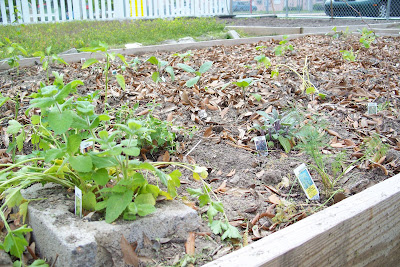I've been to DC twice before, but for sightseeing purposes. This time, I went as part of the Louisiana Disaster Recovery Foundation's Equity & Inclusion (E&I) campaign, a multi-state advocacy effort to bring about legislative change favorable to a just and inclusive hurricane recovery in Louisiana, Mississippi, & Alabama. The campaign focuses on bringing together non-profits interested in a wide range of recovery-related issues to work on wider initiatives designed to create not only a bandaid solution to the Gulf Coast but a foundation for future prosperity--especially pertinent given that LA, MS, & AL are consistently at the bottom of the barrel in education, health, and poverty rankings.
The bill I spent most of my time working on is HR 4048, The Gulf Coast Civic Works Act, a WPA-style program that would bring 100,000 high-quality jobs & the necessary training to the Gulf Coast, along with infrastructure & public works rebuilding, and would provide for the preservation of Gulf Coast culture by organizing and centralizing all of the hurricane refugee stories that were gathered post-Katrina & Rita in the Library of Congress, a la the collections of slave & Depression-era narratives. Public works rebuilding is critical for our region--many communities still look like Pass Christian, where almost all essential public services, from the police to City Hall to the library to the local bank branch, continue to operate out of trailers. Many schools remain still shut down, including Frantz Elementary School in New Orleans, the location of this famous Norman Rockwell painting:


Roads, harbors, bridges, levees--across the region infrastructure is in sore need of replacement, rebuilding, or shoring up. The work is there; the irony is that we don't have enough local, qualified workers to do the job. I should note that I'm not, in principle, against workers coming in from elsewhere to accomplish the work (I'm an imported "worker" myself and I work with immigrants), but it only strengthens the local economy to grow the existent workforce, giving them the training to secure living-wage jobs and establishing a solid base of high-skilled workers to maintain the newly rebuilt infrastructure & public works facilities for years to come. The Gulf Coast Civil Works Act addresses this with a 3-tiered system: the first round of jobs would go to local residents and displaced storm refugees; the second, to state residents; the third would be open to workers from everywhere. All rounds would prioritize women and minorities as potential job candidates; my friends K & J, who work in a women-in-construction program, point out that often, (minority) women are the sole breadwinners and it is in everyone's best interest to provide them with training & quality jobs.
Another good thing about this bill is that it will leverage successful existing programs, like Job Corps and NCCC (National Civilian Community Corps), not reinvent the wheel. One of my roles during our talks with Congressional staffers was to share a story that would "bring to life" the reason we need the Gulf Coast Civil Works Act. Here's the story I told:
I'm a caseworker at an organization that works with the immigrant community on the Coast. One of my client's sons, Jaime, is 17 and has dropped out of high school to support his family by working a construction job. We're getting him enrolled in Job Corps, a federal program which will help him get his GED, improve his English, and learn HVAC [heating and air conditioning] skills so that he could earn more money, better support his family, and contribute more to society. But the local Job Corps center, in the town where Jaime and his family live, has been closed since the storm, and the next nearest site is three hours away. Jaime will only be able to come home twice a year, and we're worried that without the support of his friends and family, he won't make it through the 2-year program. But with the Gulf Coast Civic Works Act, the center could be re-opened and the highly successful program--it has upwards of 90% job placement--could be incorporated into the Act as a solution to both the deficit of high-skilled jobs in the area and as a public works project in and of itself.Then I deferred to my colleagues as to the numbers, the "ask" (what we're looking for the Congressman/woman to commit to), etc. Each of us had a part to play, coming from different issues, states, and organizations; we tag-teamed it beautifully and almost had Dennis Kucinich's top legislative adviser crying. No really, she teared up talking about how her family wouldn't have survived without the New Deal. Granted, Kucinich's office was an easy win; but we tailored our presentation to each office, pulling in the fact that Congressman Wu (D-OR 1st) is an immigrant himself (from Taiwan), or flooding Rep. Danny Davis' (D-IL 7th) with all our Chicagoland ties, or chattin' up Rep. Hinojosa's (D-TX 15th) front desk man whose grandfather died in the same Houston hospital where I was born (no connection too tenuous!). We hit up all the members on the Education & Labor committee, where our bill will have to go if it is to reach the House floor (see the School House Rocks video I used in my ESL the other day to help one of our students study for his citizenship test: "I'm Just a Bill" ). On Friday, our last day there, we reconfigured into state delegations and went to see Reps. Bennie Thompson (D-MS
Did someone say chic, overpriced boutique hotel? (paid for by non-profit $$, eek):

The robes really are a hoot, though:
 Our nation's Capitol, with (spring!!) flowers:
Our nation's Capitol, with (spring!!) flowers: The Nationals game at their new park (sadly, they lost, but I scored my first-ever entire baseball game!):
The Nationals game at their new park (sadly, they lost, but I scored my first-ever entire baseball game!): Meems, Turtle Girl (Go Sox!), & the lovely Cat:
Meems, Turtle Girl (Go Sox!), & the lovely Cat:
The traditional 4th inning stretch Big Head Presidents Race--best 4th inning entertainment ever. Special points for powdered wigs and top hats.

Teddy never gets any love:
 Dogwoods!
Dogwoods! More dogwoods:
More dogwoods: Metro peeps unaware that I'm photographing them (you fall for public transportation hard when you've gone without for over a year):
Metro peeps unaware that I'm photographing them (you fall for public transportation hard when you've gone without for over a year):  La Corte Suprema:
La Corte Suprema:
Doesn't she look fab?

Word.

From our walk around the Capitol Hill neighborhood--spring!
 Steve & Kieulin, lobbying homies:
Steve & Kieulin, lobbying homies:
???

Lovely flowers:



Rhubarb, where have you been all my life??

Enjoying a cold (nonalcoholic) one in Capitol Hill. Note Kieulin cracking up and the wig shop in the background.

Care for a bite of vegan-friendly sandwich, Leah? Why yes, Steve, thanks!
 My team, super-sharp in front of the Cannon House Office Building.
My team, super-sharp in front of the Cannon House Office Building. We get ready to kick (or kiss?) some Congressional behind!
We get ready to kick (or kiss?) some Congressional behind!
A half-demo'd building which looks like its face melted off. Public art, anyone?
































